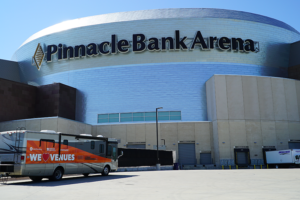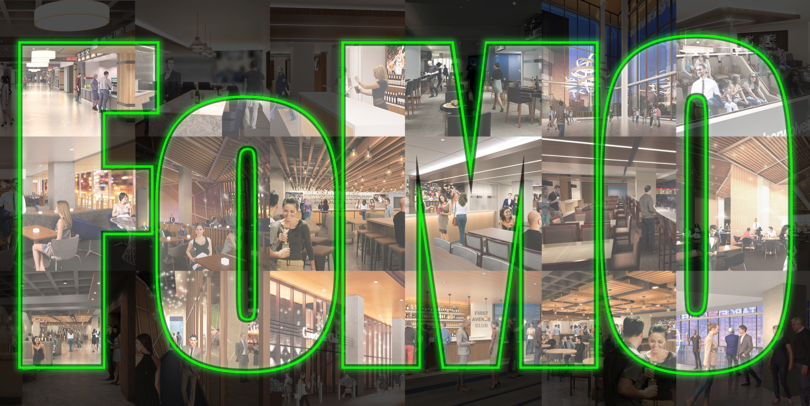RedZone Purchasing Group Lends Buying Power To Public Assembly Venues
While spending part of his career as director of business development for Nationwide Medical/Surgical, Peter Secord had an up-close look at the world of group purchasing, a process that can be described as buying facility essentials in bulk at discounted prices.
“I basically recognized that in the world of professional sports and within venues that these events take place that there was not a  group purchasing program,” said Secord, who took a leap by starting his own company, RedZone Group Purchasing, in January 2012. “Now, I have a third of the NFL signed up. I started focusing on stadiums, arenas, performing arts centers, and convention centers. Because IAVM has such a presence in that world, I came to Dallas a couple of months ago and sat down to discuss how this could benefit even IAVM. We talked about how my company could fit in to the IAVM community.
group purchasing program,” said Secord, who took a leap by starting his own company, RedZone Group Purchasing, in January 2012. “Now, I have a third of the NFL signed up. I started focusing on stadiums, arenas, performing arts centers, and convention centers. Because IAVM has such a presence in that world, I came to Dallas a couple of months ago and sat down to discuss how this could benefit even IAVM. We talked about how my company could fit in to the IAVM community.
“I spent most of my career in sales, and although I don’t have anything I’m selling, I’m selling a free program.”
It is a program that continues expanding as more venues become members of RedZone Group and take advantage of cost savings from 25 percent to 60 percent in purchasing buys. In short, the program reduces expenditures for great financial performance at no cost.
RedZone Group Purchasing offers directors and managers of arenas, stadiums and convention centers access to a nationwide group purchasing program. The purchasing program brings buying power to all members though procurement agreements focused on sports medicine, food and beverage, facility maintenance, office supplies and equipment rentals.
Brian Liivak, director of operations at the SMG-managed Tucson Convention Center, said that he was able to identify multiple projects that could be completed in a more cost-effective manner through RedZone.
“One was an AED purchase for the Dominion Arts Theater,” he said. “If we used our current provider it would have cost over $8,500 to purchase four new AEDs, but by leveraging the purchasing power of the GPO we were able to get a reduced price directly from the equipment provider, Phillips. We had a cost savings of over $4,000. Another project we looked at was the LED bulb replacement of all the marquee lights at the same building. Unfortunately, this project was completed prior to us establishing the relationship with RedZone but had we used their pricing advantage we would have saved over $3,000 on this project.”
Secord likes to point out other examples, including the purchase of Herman Miller Chairs for executives at the Spectrum Center, home to the NBA Charlotte Hornets.
“They called and said they wanted to buy some chairs for their executives,” Secord said. “I told them that we had a contract with Herman Miller Chairs and to just let me know what kind of chair they wanted to buy. They gave me a description and name and we put them in touch with a local furniture dealer in Charlotte. They bought the chairs and saved 58 percent.”
Secord said that purchasing often gets overlooked at public assembly venues.
“The fact is that purchasing is a really big deal,” he said. “There is an assumption that you do your best, negotiate with your vendors as best you can. You do that and there’s no reason to mention purchasing. I say timeout here! Purchasing is a big deal. It is something that can be improved upon. When we can save the SAP Center arena in San Jose 28 percent and they are using the same user name, password and vendor, to me that screams opportunity. The folks in Charlotte saved 58 percent on Herman Miller Chairs, and they don’t pay anything to be a member.
“I have been in sales so I don’t ever like to use the term no-brainer or if it sounds too good to be true it usually is. That is true. RedZone gets paid by the manufacturers, who pay a fee to the group purchasing organization.”
Secord noted that some of the name companies that are part of RedZone include Cintas, Grainger, Best Buy, Orkin, Tennant, SupplyWorks, Office Depot, Staples, US Foods, Johnson Controls, SimplexGrinnell, Sears, Tyco, and more. In other words, businesses that provide products that those in the public assembly venue world use.
Liivak cited an example with Grainger that was obviously received favorably by his bosses in Tucson.
“We were able to get discounts with Grainger and initiate a relationship with our local rep,” he said. “After working in Richmond for over two years, we had never met our Grainger rep, but as soon as I associated our local account with the RedZone account he set up a meeting with us to discuss our options moving forward.
“The rep gave us an across-the-board discount, additional categorized discounts for items we frequently purchased as well as informed us of all the safety and service audits they could provide or coordinate for us as a valued customer. It was an amazing turnaround for a company that we only used in worst-case scenarios due to their high pricing.”
EventBooking’s Road To VenueConnect: Week 1 Recap
By John Platillero
Our first week on the Road to VenueConnect was hilariously described by my colleagues as “The Griswolds Meet The Office” road trip. I must admit, covering 6,000-plus miles in three weeks and visiting as many venues as possible on our way to the IAVM VenueConnect conference is a bit crazy. We’re meeting with venue professionals in multiple cities to ask, “How can venue technology evolve to make your job easier?” Then we listen.
When I started EventBooking in 1997, no one had heard of “web-based software” or “software as a service.” Google calendar didn’t  exist and a few lucky venue employees had an AOL dial-up account. A lot has changed since then and expectations are high for venue tech companies to be in touch with the needs of the industry, if not ahead of the game. Fortunately, speaking with event professionals face-to-face is a great way to do just that.
exist and a few lucky venue employees had an AOL dial-up account. A lot has changed since then and expectations are high for venue tech companies to be in touch with the needs of the industry, if not ahead of the game. Fortunately, speaking with event professionals face-to-face is a great way to do just that.
Our first workshop was just down the road from our office, graciously hosted by the Knoxville Convention Center. From there, we’ve made our way to Chicago, Davenport, Des Moines, Lincoln, and Topeka. The venues represented in each discussion always vary in size and type, but face similar challenges and seem to enjoy learning a few tips from each other.
One of the interesting unknowns in all of this is whether or not we will actually make it to Nashville. You see, I borrowed a 10-year-old RV that has seen better days. In our first week, we have already pulled some incredible MacGyver moves—complete with three small nails, duct tape, and some prayerful pleas. There was also span of time which convinced us that the AC and electricity was indefinitely broken, but thanks to a mysterious, unlabeled button we pressed as a last-ditch effort, we are back in business.
If we make it, we will be excited to present our findings at this year’s VenueConnect annual conference. Hope to see you along the way!
View EventBooking’s Week 1 video experience here.
To join us at one of our stops, click here.
John Platillero is founder & CEO of EventBooking
Andrew Saunders Promoted To Director Of Booking At Venue Coalition
Venue Coalition announced that it has promoted Andrew Saunders to Director of Booking. In his expanded role, Saunders will focus on business development while continuing to service new and existing Venue Coalition arena clients.
Saunders started his career with Venue Coalition in 2012 after graduating from USC’s Music Industry and Business Entrepreneurship programs. After working at Venue Coalition for two years, he was recruited by Gelfand, Rennert & Feldman, one of the industry’s most prestigious business management firms, to work in their tour accounting office. While at the firm, Saunders worked on a number of projects, including North American and European tours for James Taylor. In 2015, Saunders returned to Venue Coalition as the company’s Booking Manager.
“I’m looking forward to this opportunity to service both new and existing clients and to book and develop incremental content for  our arena members” Saunders said.
our arena members” Saunders said.
“Andrew has a thorough understanding of our client’s needs and he has done an outstanding job of servicing our members,” added Jeff Apregan, President. “He has accomplished so much in such a short time. Wwe are excited for this new chapter to begin.”
Venue Coalition is a live entertainment consulting company that provides strategic planning, project management and talent booking services for arenas, theaters and public assembly venues. On behalf of their venue clients, Venue Coalition actively reaches out to key decision makers in the live entertainment and touring industries to influence routing decisions and ultimately increase event days in each of its participating member arenas.
The Modern Arena: A Destination to Appeal to Many & Keep FoMO Away

We have all had that moment when an Instagram post or a Snapchat story of our friend makes us feel like we are not quite as cool or included as we should be. FoMO, or the Fear of Missing Out, refers to the feeling of “fear of not being included in something (such as an interesting or enjoyable activity) that others are experiencing.” It was added to the Merriam-Webster Dictionary in 2016. Following this current trend, millennials and people in general prefer to spend money on experiences instead of goods, and this new emphasis on experiences is changing the role of the modern-day arena.
Greater Tacoma Convention Center Gets Approval For Hotel Project
The Tacoma (WA) City Council has approved an amended agreement with Yareton Investment and Management (Washington) L.L.C., as well as property conveyance for a hotel project for the Greater Tacoma Convention Center. Conducted without public subsidy, the development represents one of the first major foreign direct investments in a commercial project on publicly-owned land in Tacoma. It is also the largest privately funded development downtown in the city’s history.
The project, estimated to cost approximately $150 million, will be completed in two phases.
The first phase, projected to cost at least $85 million, will involve the construction of a 4-star, 300-room hotel with a 10,000  square foot grand ballroom, retail and other function rooms. The hotel operator is Interstate Hotels & Resorts in Alexandria, VA, the leading U.S.-based global hotel management company, operating branded full- and select-service hotels and resorts, convention centers and independent hotels worldwide. The brand is Marriott International in Bethesda, MD, which encompasses a portfolio of more than 6,100 properties in 30 leading hotel brands spanning 124 countries and territories.
square foot grand ballroom, retail and other function rooms. The hotel operator is Interstate Hotels & Resorts in Alexandria, VA, the leading U.S.-based global hotel management company, operating branded full- and select-service hotels and resorts, convention centers and independent hotels worldwide. The brand is Marriott International in Bethesda, MD, which encompasses a portfolio of more than 6,100 properties in 30 leading hotel brands spanning 124 countries and territories.
The second phase, estimated to cost approximately $65 million, will involve the construction of approximately 200 apartments/condominiums based on market demand, with retail, after the hotel is operational.
The development is projected to boost utilization of the Greater Tacoma Convention Center, and generate substantial revenue through property, sales, B&O, utility and hotel-motel taxes. It is also projected to create approximately 1,000 construction jobs and 200 full-time hotel-related jobs.
The development is scheduled to break ground on August 8, 2017.
Do you want to receive a Front Row News weekly digest?
Categories
- Allied (856)
- Architecture (147)
- Arenas (744)
- Career (890)
- Convention Centers (889)
- Education (608)
- Events (1,528)
- Food & Beverage (193)
- Foundation (113)
- Guest Experience (1,482)
- Industry News (2,253)
- Leadership (1,872)
- Marketing (150)
- Membership (1,985)
- Music (212)
- Performing Arts Centers (453)
- Professional Development (398)
- Research (127)
- Safety & Security (425)
- Sports (763)
- Stadiums (607)
- Student (159)
- Technology (515)
- Ticketing (92)
- Touring (82)
- Trends (357)
- Uncategorized (772)
- Universities (216)
- Video (25)
- Young Professional (198)
Twitter Feed
- Twitter feed loading
Recent Posts
- Prof. Gil Fried Honored at 37th Annual Sport Recreation and Law Association (SRLA) Conference with Two Major Awards
- GEODIS Park Selects Allied Universal As Its Preferred Event Services Provider
- Venuworks Appoints Marc Solis as Executive Director of the Fresno Convention and Entertainment Center
- Los Angeles Convention Center Diverts 8,000 Pounds of Wood Waste to Local Foundation Supporting Fire Victims
- Fort Worth Unveils Plans for Phase 2 of Convention Center Transformation
Categories
- Allied
- Architecture
- Arenas
- Career
- Convention Centers
- Education
- Events
- Food & Beverage
- Foundation
- Guest Experience
- Industry News
- Leadership
- Marketing
- Membership
- Music
- Performing Arts Centers
- Professional Development
- Research
- Safety & Security
- Sports
- Stadiums
- Student
- Technology
- Ticketing
- Touring
- Trends
- Uncategorized
- Universities
- Video
- Young Professional
Archives
- March 2026
- February 2026
- January 2026
- December 2025
- November 2025
- October 2025
- September 2025
- August 2025
- July 2025
- June 2025
- May 2025
- April 2025
- March 2025
- February 2025
- January 2025
- December 2024
- November 2024
- October 2024
- September 2024
- August 2024
- July 2024
- June 2024
- May 2024
- April 2024
- March 2024
- February 2024
- January 2024
- December 2023
- November 2023
- October 2023
- September 2023
- August 2023
- July 2023
- June 2023
- May 2023
- April 2023
- March 2023
- February 2023
- January 2023
- December 2022
- November 2022
- October 2022
- September 2022
- August 2022
- July 2022
- June 2022
- May 2022
- April 2022
- March 2022
- February 2022
- January 2022
- December 2021
- November 2021
- October 2021
- September 2021
- August 2021
- July 2021
- June 2021
- May 2021
- April 2021
- March 2021
- February 2021
- January 2021
- December 2020
- November 2020
- October 2020
- September 2020
- August 2020
- July 2020
- June 2020
- May 2020
- April 2020
- March 2020
- February 2020
- January 2020
- December 2019
- November 2019
- October 2019
- September 2019
- August 2019
- July 2019
- June 2019
- May 2019
- April 2019
- March 2019
- February 2019
- January 2019
- December 2018
- November 2018
- October 2018
- September 2018
- August 2018
- July 2018
- June 2018
- May 2018
- April 2018
- March 2018
- February 2018
- January 2018
- December 2017
- November 2017
- October 2017
- September 2017
- August 2017
- July 2017
- June 2017
- May 2017
- April 2017
- March 2017
- February 2017
- January 2017
- December 2016
- November 2016
- October 2016
- September 2016
- August 2016
- July 2016
- June 2016
- May 2016
- April 2016
- March 2016
- February 2016
- January 2016
- December 2015
- November 2015
- October 2015
- September 2015
- August 2015
- July 2015
- June 2015
- May 2015
- April 2015
- March 2015
- February 2015
- January 2015
- December 2014
- November 2014
- October 2014
- September 2014
- August 2014
- July 2014
- June 2014
- May 2014
- April 2014
- March 2014
- February 2014
- January 2014
- December 2013
- November 2013
- October 2013
- September 2013
- August 2013
- July 2013
- June 2013
- May 2013
- April 2013
- March 2013
- February 2013
- January 2013
- May 2012
- March 2012
- December 2011
- November 2011
- October 2011
Recent Comments
- Frank Bradshaw, Ph.D., CVE on John Meyer, CVE, a Tireless Advocate of Certification for Venue Professionals, Has Died
- Neil Sulkes on Hilary Hartung, Friend to Many in Venue Marketing, Has Left Us
- Jason Parker, CVE on The Devastation of Hurricane Helene and How We Can Support One Another
- Larry Perkins on Touhey Testifies Against Speculative Ticketing Before Congressional Subcommittee
- Peter Secord on Major Players for Planned Elkhart Amphitheater Were in the Mix at VenueConnect
